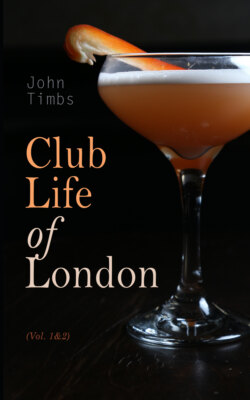Читать книгу Club Life of London (Vol. 1&2) - John Timbs - Страница 20
На сайте Литреса книга снята с продажи.
THE TATLER'S CLUB
IN SHIRE-LANE.
ОглавлениеTable of Contents
Shire-lane, alias Rogue-lane, (which falleth into Fleet-street by Temple Bar,) has lost its old name—it is now called Lower Serle's-place. If the morals of Shire-lane have mended thereby, we must not repine.
Here lived Sir Charles Sedley; and here his son, the dramatic poet, was born, "neere the Globe." Here, too, lived Elias Ashmole, and here Antony à Wood dined with him: this was at the upper end of the lane. Here, too, was the Trumpet tavern, where Isaac Bickerstaff met his Club. At this house he dated a great number of his papers; and hence he led down the lane, into Fleet-street, the deputation of "Twaddlers" from the country, to Dick's Coffee-house, which we never enter without remembering the glorious humour of Addison and Steele, in the Tatler, No. 86. Sir Harry Quickset, Sir Giles Wheelbarrow, and other persons of quality, having reached the Tatler's by appointment, and it being settled that they should "adjourn to some public-house, and enter upon business," the precedence was attended with much difficulty; when, upon a false alarm of "fire," all ran down as fast as they could, without order or ceremony, and drew up in the street.
The Tatler proceeds: "In this order we marched down Sheer-lane, at the upper end of which I lodge. When we came to Temple Bar, Sir Harry and Sir Giles got over, but a run of coaches kept the rest of us on this side of the street; however, we all at last landed, and drew up in very good order before Ben Tooke's shop, who favoured our rallying with great humanity; from whence we proceeded again, until we came to Dick's Coffee-house, where I designed to carry them. Here we were at our old difficulty, and took up the street upon the same ceremony. We proceeded through the entry, and were so necessarily kept in order by the situation, that we were now got into the coffee-house itself, where, as soon as we had arrived, we repeated our civilities to each other; after which we marched up to the high table, which has an ascent to it enclosed in the middle of the room. The whole house was alarmed at this entry, made up of persons of so much state and rusticity."
The Tatler's Club is immortalized in his No. 132. Its members are smokers and old story-tellers, rather easy than shining companions, promoting the thoughts tranquilly bedward, and not the less comfortable to Mr. Bickerstaff because he finds himself the leading wit among them. There is old Sir Jeffrey Notch, who has had misfortunes in the world, and calls every thriving man a pitiful upstart, by no means to the general dissatisfaction; there is Major Matchlock, who served in the last Civil Wars, and every night tells them of his having been knocked off his horse at the rising of the London apprentices, for which he is in great esteem; there is honest Dick Reptile, who says little himself, but who laughs at all the jokes; and there is the elderly bencher of the Temple, and, next to Mr. Bickerstaff, the wit of the company, who has by heart the couplets of Hudibras, which he regularly applies before leaving the Club of an evening; and who, if any modern wit or town frolic be mentioned, shakes his head at the dulness of the present age, and tells a story of Jack Ogle. As for Mr. Bickerstaff himself, he is esteemed among them because they see he is something respected by others; but though they concede to him a great deal of learning, they credit him with small knowledge of the world, "insomuch that the Major sometimes, in the height of his military pride, calls me philosopher; and Sir Jeffrey, no longer ago than last night, upon a dispute what day of the month it was then in Holland, pulled his pipe out of his mouth, and cried, 'What does the scholar say to that?'"
Upon Addison's return to England, he found his friend Steele established among the wits; and they were both received with great honour at the Trumpet, as well as at Will's, and the St. James's.
The Trumpet public-house lasted to our time; it was changed to the Duke of York sign, but has long disappeared: we remember an old drawing of the Trumpet, by Sam. Ireland, engraved in the Monthly Magazine.
